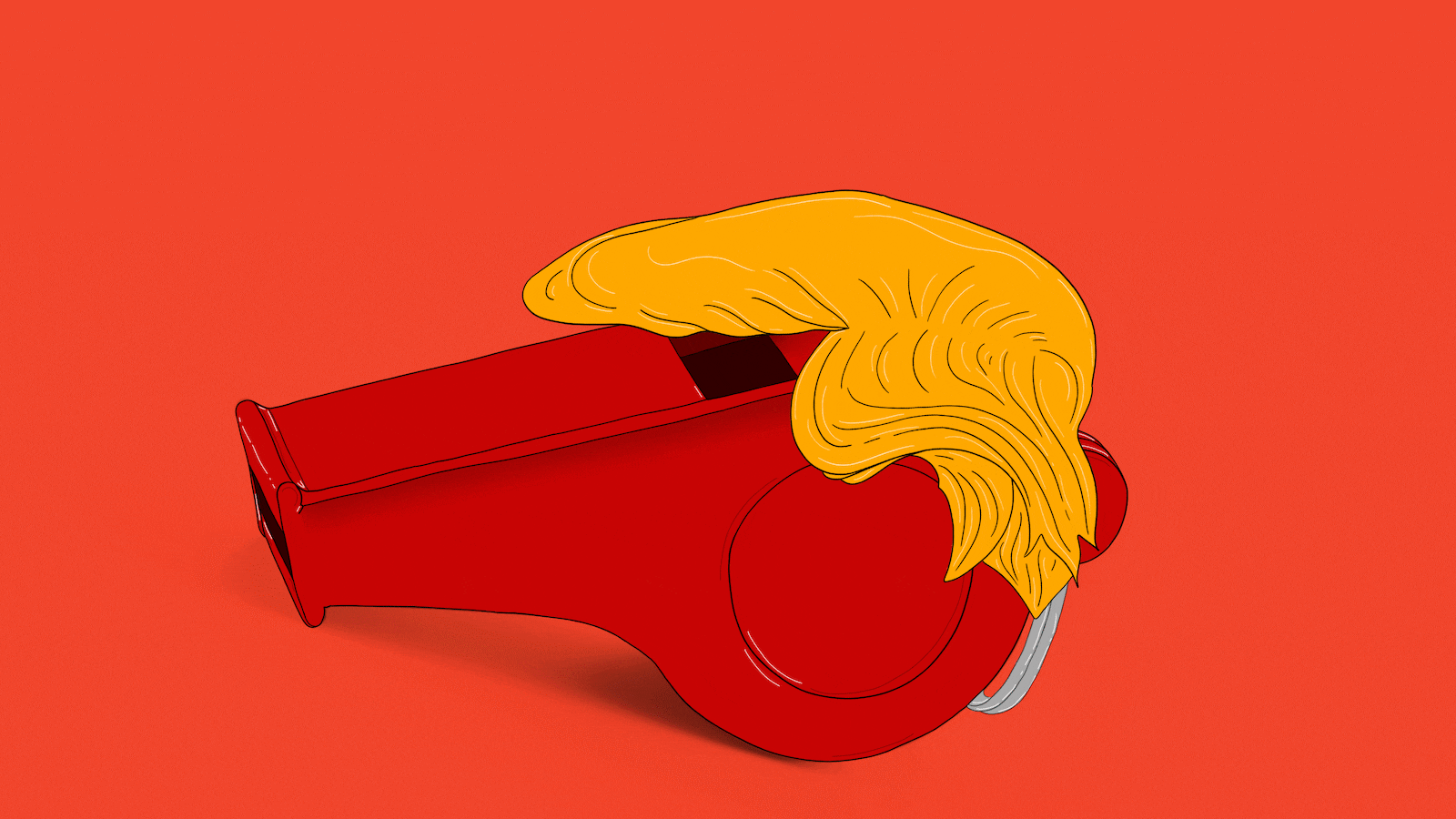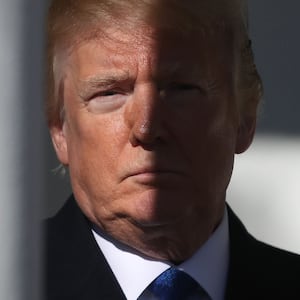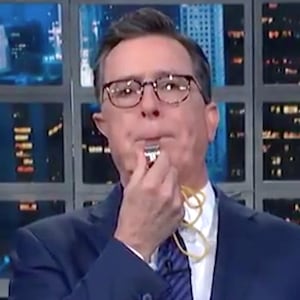An explosive whistleblower complaint that is threatening to paralyze much of Washington, D.C., now may upend the 2020 presidential campaign.
This week it was reported the complaint involves President Donald Trump asking Ukraine’s president to investigate the son of Joe Biden. The Wall Street Journal reported Friday, citing sources, that Trump asked Ukraine’s leader eight times during a July phone call to investigate Biden’s son and his work in Ukraine. The Washington Post reported that while the call did not contain an explicit quid pro quo, it is “part of a broader set of facts included in the whistleblower complaint.”
The complaint was significant enough to prompt the intelligence community’s inspector general to bring it to the attention of the director of national intelligence, who has not made it available to Congress in part because of objections from the Department of Justice.
Andrew Bakaj, a former CIA officer and managing partner at the Compass Ross Legal Group who is representing the whistleblower, declined to comment for this story. Trump, on Friday morning, called the stories "ridiculous" and the whistleblower "partisan"—despite admitting later that he didn't know the whistleblower's identity—while claiming that his conversations with world leaders are “always appropriate, at the highest level always appropriate.”
But the revelation of Ukraine’s involvement, nevertheless, is a tantalizing clue about just how sensitive the matter may be. That’s because Ukraine has been at the epicenter of the president and his team’s efforts to damage the Democratic candidate they currently consider the biggest threat in 2020: former Vice President Joe Biden.
Biden issued a statement Friday calling Trump’s reported behavior with Ukraine “particularly abhorrent” for its exploitation of American foreign policy to get a “political favor.” “If these reports are true, then there is truly no bottom to President Trump’s willingness to abuse his power and abase our country,” he said.
Shortly after his election, Ukraine’s new president, Volodymyr Zelensky, and his team found themselves being pressured by Rudy Giuliani, Trump’s lawyer and confidant, to further an investigation into whether Biden may or may not have applied pressure to curtail an investigation into his son Hunter’s role on the board of Burisma, a Ukrainian gas company.
Giuliani has said he was also inquiring about matters related to the 2016 election and attempts to dig up dirt on Trump’s former aide, Paul Manafort. He also has defended his desire to dig up dirt on Biden and his willingness to work with foreign sources to do so.
A source with direct knowledge of the situation says that in recent months he has informally advised Trump on how to approach Zelensky. That advice came around the time rumors started flying that the president was withholding aid to the Ukrainian government until he received assurances the Biden investigation would move forward.
“He’s a question mark. There are a lot of good things, but there are these people he surrounds himself with,” Giuliani said of Zelensky in a conversation with The Daily Beast in late July. “He’s been there too short a period of time to know how he’s going to act. But I think there are very good signs and I have an open mind.”
On Thursday evening, when asked about the latest Ukraine revelation and if it was related to his well-publicized efforts, Giuliani simply said, “Don’t know and don’t care. Let them [the Democrats] knock themselves out.” Asked whether anybody had been in touch with him yet about the whistleblower complaint, the Trump attorney responded, “No, it’s total bull[shit].” He then claimed that “Biden did bribery, and you don’t cover it. I did my job as a good lawyer [for President Trump] and Corrupt Media gets excited.”
The Trump administration ultimately did sign off on a major military aid package, releasing it on Sept. 12. Zelensky spoke to Trump in late July. The readout of that call from the Ukrainian camp reportedly noted that Trump was focused on Ukraine’s ability to “complete investigations into corruption cases that have hampered Ukraine-US cooperation.”
In a separate interview with CNN on Thursday night, Giuliani said he believed it was “perfectly appropriate” for a president to ask a leader of a foreign country to investigate allegations of corruption, even those involving political leaders from another party. He also said Trump has a right to withhold aid to a country until it cleans up corruption.
Biden’s presidential campaign declined a request for comment. Michael Carpenter, who served in the White House as a foreign policy adviser to Biden, said: “If President Trump promised President Zelensky security assistance as a quid pro quo for launching politically motivated investigations against his 2020 presidential opponents, that would constitute a clear abuse of office by the president. At this point, however, we don’t know all the facts, which is precisely why Congress needs to get to the bottom of this.”
Zelensky did meet with Senator Chris Murphy (D-CT) on Sept. 5. In a briefing with reporters five days later, the senator said he had encouraged him to not respond to requests made from political actors in the United States, that “it was much better for the president to rebuff any pressure he's getting from political campaigns in the United States to conduct investigations.” Zelensky, Murphy recounted, “was ready for that question, you know, he wasn't surprised that I brought it up. And his response was pretty simple that they have no intention of getting involved in an American election.”
As The Daily Beast first reported in June, House Democrats had been looking for months to open a probe into Giuliani for his overseas political and consulting work, including his efforts to uncover dirt on Biden. And it could very well be that the whistleblower complaint adds fuel to those investigations, though so far lawmakers on the Hill seem to be as in the dark about the matter as the public itself.
On Thursday, the IC’s inspector general, Michael Atkinson, held a four-hour closed-door briefing with members of the House Intelligence Committee. Members were tight-lipped over any details of the exchanges, save to say that Atkinson conducted the briefing in a hearing-like fashion, speaking for a length of time at the beginning before answering questions from the ranking chairs of the committee.
Overall, members said they left the briefing with the clear impression that the complaint raised grave concerns about U.S. national security interests and needed immediate attention. Days earlier, Atkinson had written a letter to committee Chairman Adam Schiff (D-CA) saying the complaint related to “one of the most significant and important of the DNI’s responsibilities to the American people.”
After the conclusion of the briefing Thursday afternoon, though, it was clear that the most burning questions members had about the complaint—and the process by which the committee learned of it—had gone unanswered.
“We knew going in he wasn’t going to talk about the complaint,” said Rep. Mike Quigley (D-IL). “No matter how clever you are, you aren’t going to find out more about it.”
Lawyers and former national security officials who spoke to The Daily Beast on Thursday said the complaint would have to have a clear connection to distinct intelligence operations or processes in order to be filed with the director of national intelligence.
In the absence of specific details about the complaint, lawmakers focused on process—and the possibility that actors in the administration are actively working to ensure Congress does not learn more about the complaint. After the hearing ended, Schiff released letters sent from the IG to his committee, in which the IG wrote that acting Director of National Intelligence Joseph Maguire had not authorized him to say anything about the whistleblower’s complaint, “affecting the execution of two of my most important duties and responsibilities,” in Atkinson’s words.
“I have requested authorization from the Acting DNI to disclose, at the very least, the general subject matter of the Complainant’s allegations to the congressional intelligence committees,” Atkinson told lawmakers in a letter dated Sept. 17. He also divulged that the DNI’s office consulted with the Department of Justice, which advised that the DNI had no obligation under the law to disclose information about the whistleblower to Congress.
While Schiff held forth in front of reporters at the end of the four-hour hearing, the top Republican on the committee, Rep. Devin Nunes (R-CA), has yet to weigh in publicly. Since the first Washington Post story on the nature of the complaint was published, some GOP lawmakers voiced a concern that the press had become an avenue for advancing the whistleblower’s story. Appearing Thursday morning on C-SPAN, Rep. Tom McClintock (R-CA) suggested the story might be fake, citing a much-criticized recent New York Times report on Brett Kavanaugh.
Asked about his sense of the situation on Thursday afternoon, Rep. John Ratcliffe (R-TX), an Intelligence Committee member, said he couldn’t divulge much—but affirmed that Republicans on the committee were taking it seriously.
Editor’s Note, 9/20/19: This story has been updated with the latest reporting on the complaint against Trump.











